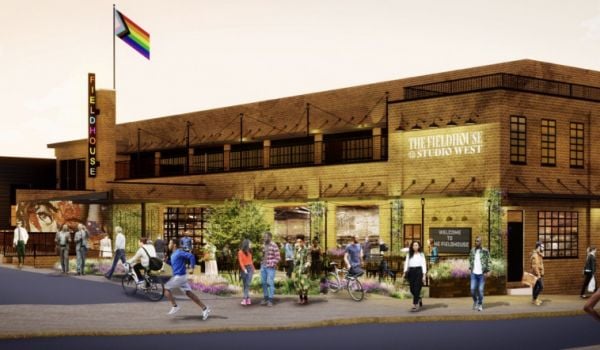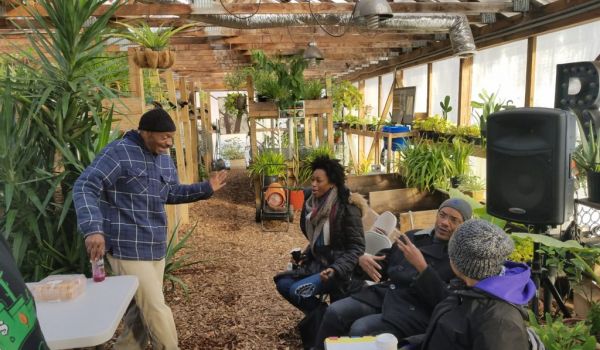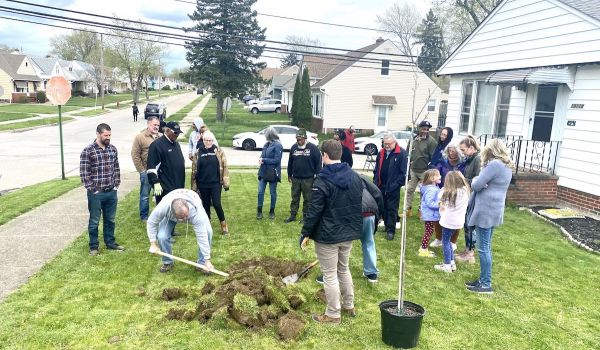The Cleveland Cavaliers may be basketball champs, but the Greater Cleveland Congregations (GCC) — a collection of about 40 churches of different denominations — would rather not see the winner take all. Earlier this year, the GCC came out against city funding of a rehab to the downtown arena that’s home to the NBA team and host to numerous big concerts.
The team, the city and Cuyahoga County want to expand the outer concourses of Quicken Loans Arena, adding more public gathering space, bars and restaurants at a cost of approximately $140 million to $160 million. Add the cost of borrowing the money, and the total ballooned up to about $250 million — to be split about evenly among the three entities. The public money would come from taxes on tickets and a portion of a hotel room sales tax.
The GCC saw an opportunity: If there was to be a public discussion over spending for an arena rehab, maybe a case could be made to spread the wealth to benefit poor Clevelanders too. Specifically, they wanted money to help pay for the expansion of crisis centers that would help some poor neighborhoods deal with drug addiction, street violence and mental illness. The church group tweaked a Cavaliers slogan to use as their own, saying they were “Not All In” on the arena deal.
“[The GCC] had been a leader in this city for issues like dealing with increased gun violence and mental health care for those in our court system, and we thought we could encourage them to become more creative, to help use the arena expansion to fund ongoing projects in depressed areas of the city,” says Rev. John Lentz, pastor of Forest Hill Presbyterian Church in Cleveland Heights.
Instead, Lentz says, they didn’t even get a seat at the table. Their suggestions, he says, “yielded no counterproposals, and, in most cases, no response at all. We wanted to bring the light of day to make this more equitable, and I find it startling that we’ve become the bad guys in some circles.”
In the end, the church opposition ended this month, and the construction of the new concourses at Quicken Loans Arena started. The GCC abandoned a push to make approval of the public spending a ballot initiative, even after the coalition obtained the necessary signatures to do so. In response to the GCC dropping the ballot initiative, the Cuyahoga County government agreed to “doing more throughout the county” for additional facilities and services for substance abuse and, mental health, though it would be “subject to the availability of resources and best practices to follow.”
Some claimed the church group caved in on its advocacy for better city services for certain neighborhoods, because they ended up with no firm assurances.
“Our hope has always been for significant improvement across the entire community, and given the circumstances it was appropriate for us to take a position that would move toward genuine dialogue,” says Rev. Richard Gibson, a leader of the GCC movement and pastor of the Elizabeth Baptist Church on Cleveland’s East Side.
In Milwaukee a few years ago, when the NBA’s Bucks announced plans for a $500 million new arena, with half being publicly funded, a coalition of churches, synagogues, mosques and community groups called the Southeastern Wisconsin Common Ground pushed for a public referendum on the arena funding proposal. They wanted money to help renovate recreation centers and playing fields, and proposed that an arena bond issue should include money for those projects in many Milwaukee neighborhoods. “The Bucks took control of the strategy from the start,” said Bob Connolly, a member of Common Ground told the New York Times in 2015. “They pushed the referendum idea right to the side.”
“One of the challenges we teach from the bible in solving problems is that sometimes the party who has received some of the challenges in mistreatment has to make the first move,” Gibson says about his perspective on the Cleveland process. “We decided we were the ones being criticized for pushing the ballot initiative, and we decided to pull that referendum and move forward by offering the olive branch.”
The GCC was formed in 2011, and had had some success with advocating for education reform in the public schools, working with the police to reduce gun violence, and working with judges to make the justice system more just for poor minorities. The arena protest required taking on two city governments, downtown business groups — and a very popular NBA team.
The Cavaliers brought up the idea of upgrading the 23-year-old arena to the city and county councils last December, and the $250 million funding plan was pushed through quickly with few hearings. The GCC took notice; it had been advocating for more investment in poor Cleveland communities throughout its six-year history, and had heard “there’s no money.”
The church group felt that a huge arena spend would do little to address the city’s poverty level. According to recent U.S. Census figures, Cleveland ranks 11th among cities in poverty in the nation, with about one-third of the city residents under the poverty level and more than 50 percent of the children living in poverty. The median household income of the entire city $26,150, while the national average is $56,516. The GCC is also concerned about violence. The city had 72 homicides in 2007 and 136 in 2016, a near doubling, though the city’s population had declined in that period.
Researchers have long examined the financial impact on cities of professional sports teams and leagues, and more than one study has cast doubt on the wisdom of investing public money in sports venues. Still, between 1990 and 2010, there were 84 new facilities built for teams playing in the four largest professional sports leagues in U.S. cities, with construction costs totaling about $34 billion — and more than half, about $20 billion, coming from public funding. Much of that was in the form of municipal bonds, which are exempt from federal taxes. According to “Public-Private Partnerships for Major League Sports Facilities,” published in 2013, that means taxpayers nationally contributed about $3 billion to help realize those projects.
Yet cooperation from city halls, in the form of subsidies or otherwise, has become expected in many ways, and those opposed are often cast in the public eye as being “against” the teams and city leadership and even team fans. Some mayors have publicly questioned the ask involved around new arenas, however, and many of these stories have culminated with a team’s ownership threatening to move to another city.
The GCC saw the Cleveland arena proposal as a chance to debate city investment — and let the public decide. The coalition got about 20,000 signatures to put the issue on the ballot. The city tried to block a referendum, but the Ohio Supreme Court ruled all was done properly.
The Cavaliers reacted swiftly. In late August, owner Dan Gilbert (the CEO of mortgage giant Quicken Loans) said the team would pull out of the arena project over the ballot referendum controversy.
However, several sources say the city and the county and the team continued to discuss a slightly different version of the funding plan, which would have forced the GCC to re-do the referendum signature process. When the GCC relented on the ballot push, the Cavs got back into the deal.
“We announced we would not put the referendum on the ballot for a number of reasons,” Gibson says. He mentions the possibility that the signatures would be irrelevant, and the difficulty of collecting a new set of signers every time the plan changed. “That is very hard to do,” Gibson says. “So we thought it might be good to just use what we have done to gain more conversation on the needs of the citizens and go from there.”
Cuyahoga County Executive Armond Budish admitted in an interview with the Cleveland Plain Dealer that there is no assurance the county might open or expand health care/crisis centers in response to the GCC’s opposition to the arena project. “I’m not in a position to tell you exactly what we’re going to be able to do right now, how much it’s going to cost or where the money’s going to come from,” Budish said in the interview. “But we’re working on it.”
There’s criticism of how this was handled from all sides. Some have problems with the church group not pursuing its protest at the ballot box (even if it was only symbolic), and many think the city and county are giving out public money to a billionaire sports team owner so he can make more money. Many sports fans think the church group has no business getting involved in public funding issues.
Some alleged that pressure from Cleveland political leaders forced the pastors to stand down. Rev. Jawanza Colvin, pastor of Cleveland’s Olivet Institutional Baptist Church, denied that, telling his congregation in early September, “Any notion or idea that anybody got to me, called me, sat me down in a room or pressured me … That some political figures and elected officials put some pressure on me … . Please. I need you to know that. I have too much trust and faith in God. There’s not anybody in this town that’s God enough to intimidate me beyond the fear of the Lord.”
Still, the two sides have not mended fences completely. Cleveland Mayor Frank Jackson issued a statement two weeks ago when the GCC announced it was giving up on the referendum. He said, in part, “I’ve said it before — this deal is one of the best I’ve seen because it provides opportunities for all of Cleveland. Those who demonized this process were shortsighted, and I encourage them to ask themselves what they can do for the future of this city. Strong leadership requires doing the right thing, not just saying what you think people want to hear.”
Gibson says he doesn’t agree with Jackson’s assessment that his group “demonized the process,” and he and the other GCC pastors will continue to work on political issues because “I think that the churches absolutely have a role in community governance and our society.”
“I’m saddened by the number of people unemployed and the lack of diversity in our city’s hiring history,” Gibson says. “People criticize us because we got no guarantee of the mental health crisis centers getting built and funded, but there will be people working from different paths to bring it to fruition. We took a step back by pulling the referendum, but that did not mean we will stop our advocacy. That will continue.”


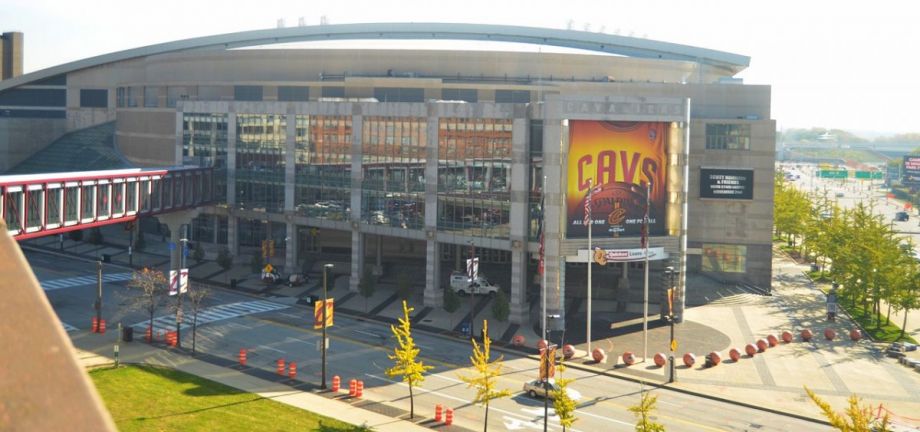
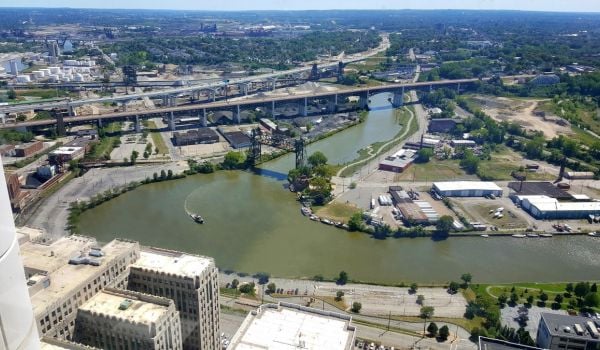


__Sean_Corrigan_from_Cleveland_Sews_(center)__and_Paula_Coggins_from_Oh_Sew_Powerful_(right)_sew_leftover_banners_from_the_NFL_Draft_into_handbags_-_photo_by_Sophie_Kannberg_600_350_80_s_c1.jpeg)
